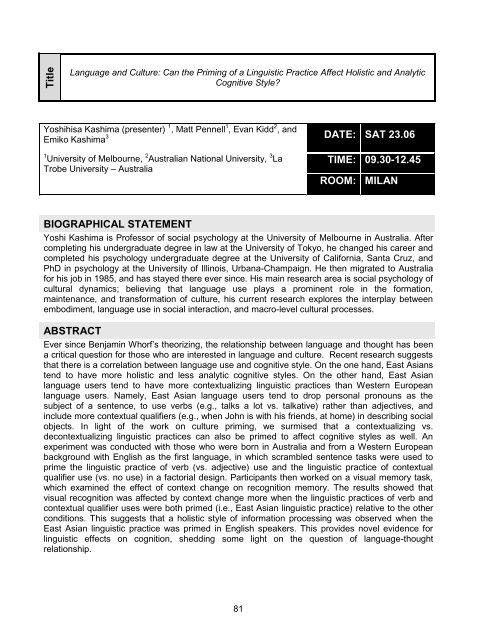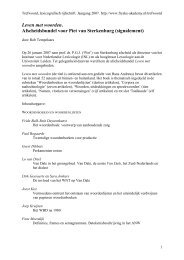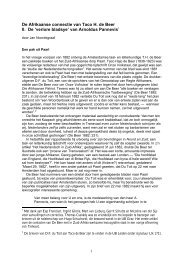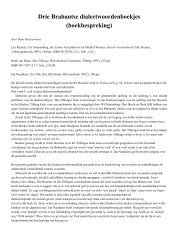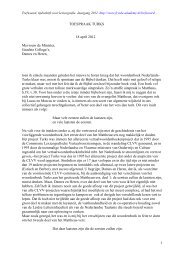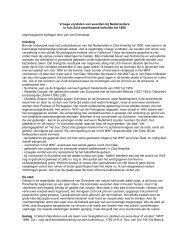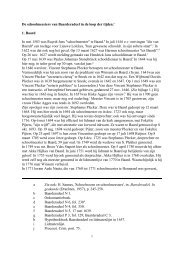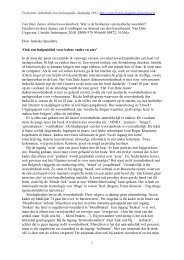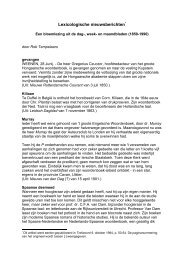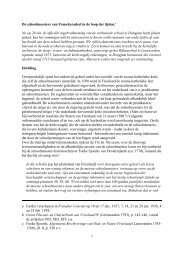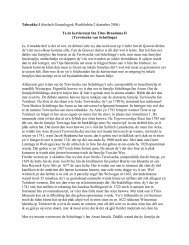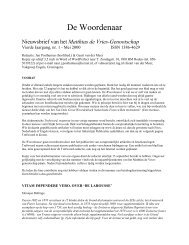Conference Book - Fryske Akademy
Conference Book - Fryske Akademy
Conference Book - Fryske Akademy
You also want an ePaper? Increase the reach of your titles
YUMPU automatically turns print PDFs into web optimized ePapers that Google loves.
Title<br />
Language and Culture: Can the Priming of a Linguistic Practice Affect Holistic and Analytic<br />
Cognitive Style?<br />
Yoshihisa Kashima (presenter) 1 , Matt Pennell 1 , Evan Kidd 2 , and<br />
Emiko Kashima 3<br />
1 University of Melbourne, 2 Australian National University, 3 La<br />
Trobe University – Australia<br />
81<br />
DATE: SAT 23.06<br />
TIME: 09.30-12.45<br />
ROOM: MILAN<br />
BIOGRAPHICAL STATEMENT<br />
Yoshi Kashima is Professor of social psychology at the University of Melbourne in Australia. After<br />
completing his undergraduate degree in law at the University of Tokyo, he changed his career and<br />
completed his psychology undergraduate degree at the University of California, Santa Cruz, and<br />
PhD in psychology at the University of Illinois, Urbana-Champaign. He then migrated to Australia<br />
for his job in 1985, and has stayed there ever since. His main research area is social psychology of<br />
cultural dynamics; believing that language use plays a prominent role in the formation,<br />
maintenance, and transformation of culture, his current research explores the interplay between<br />
embodiment, language use in social interaction, and macro-level cultural processes.<br />
ABSTRACT<br />
Ever since Benjamin Whorf‘s theorizing, the relationship between language and thought has been<br />
a critical question for those who are interested in language and culture. Recent research suggests<br />
that there is a correlation between language use and cognitive style. On the one hand, East Asians<br />
tend to have more holistic and less analytic cognitive styles. On the other hand, East Asian<br />
language users tend to have more contextualizing linguistic practices than Western European<br />
language users. Namely, East Asian language users tend to drop personal pronouns as the<br />
subject of a sentence, to use verbs (e.g., talks a lot vs. talkative) rather than adjectives, and<br />
include more contextual qualifiers (e.g., when John is with his friends, at home) in describing social<br />
objects. In light of the work on culture priming, we surmised that a contextualizing vs.<br />
decontextualizing linguistic practices can also be primed to affect cognitive styles as well. An<br />
experiment was conducted with those who were born in Australia and from a Western European<br />
background with English as the first language, in which scrambled sentence tasks were used to<br />
prime the linguistic practice of verb (vs. adjective) use and the linguistic practice of contextual<br />
qualifier use (vs. no use) in a factorial design. Participants then worked on a visual memory task,<br />
which examined the effect of context change on recognition memory. The results showed that<br />
visual recognition was affected by context change more when the linguistic practices of verb and<br />
contextual qualifier uses were both primed (i.e., East Asian linguistic practice) relative to the other<br />
conditions. This suggests that a holistic style of information processing was observed when the<br />
East Asian linguistic practice was primed in English speakers. This provides novel evidence for<br />
linguistic effects on cognition, shedding some light on the question of language-thought<br />
relationship.


